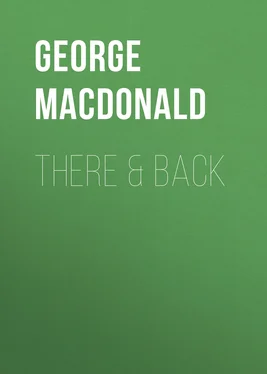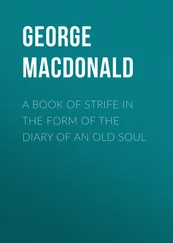George MacDonald - There & Back
Здесь есть возможность читать онлайн «George MacDonald - There & Back» — ознакомительный отрывок электронной книги совершенно бесплатно, а после прочтения отрывка купить полную версию. В некоторых случаях можно слушать аудио, скачать через торрент в формате fb2 и присутствует краткое содержание. Жанр: foreign_prose, foreign_religion, foreign_antique, на английском языке. Описание произведения, (предисловие) а так же отзывы посетителей доступны на портале библиотеки ЛибКат.
- Название:There & Back
- Автор:
- Жанр:
- Год:неизвестен
- ISBN:нет данных
- Рейтинг книги:4 / 5. Голосов: 1
-
Избранное:Добавить в избранное
- Отзывы:
-
Ваша оценка:
- 80
- 1
- 2
- 3
- 4
- 5
There & Back: краткое содержание, описание и аннотация
Предлагаем к чтению аннотацию, описание, краткое содержание или предисловие (зависит от того, что написал сам автор книги «There & Back»). Если вы не нашли необходимую информацию о книге — напишите в комментариях, мы постараемся отыскать её.
There & Back — читать онлайн ознакомительный отрывок
Ниже представлен текст книги, разбитый по страницам. Система сохранения места последней прочитанной страницы, позволяет с удобством читать онлайн бесплатно книгу «There & Back», без необходимости каждый раз заново искать на чём Вы остановились. Поставьте закладку, и сможете в любой момент перейти на страницу, на которой закончили чтение.
Интервал:
Закладка:
She stood at length in the broad moonlight, on the white, far-reaching road. Her heart beat so fast as almost to stifle her. She dared not look down at the child, lest some one should see her and look also! The moon herself had an aspect of suspicion! Why did she keep staring so? For an instant she wished herself back in the nursery. But she knew it would only be to do it all over again: it had to be done! Leave the child of her sister where he was counted in the way! with those who hated him! where his helpless life was in danger! She could not!
But, while she thought, she did not stand. Softly, with great strides she went stalking along the road. She knew the country: she was not many miles from her father’s forge, whence at moments she seemed to hear the ring of his hammer through the still night.
She kept to the road for three or four miles, then turned aside on a great moor stretching far to the south: daybreak was coming fast; she must find some cottage or natural shelter, lest the light should betray her. When the sun had made his round, and yielded his place to the friendly night, she would start afresh! In her bundle she had enough for the baby; for herself, she could hold out many hours unfed. A few more miles from Mortgrange, and no one would know her, neither from any possible description could they be suspected in the garments they wore! Her object in hiding their usual attire had been, that it might be taken for granted they had gone away in it.
She did not slacken her pace till she had walked five miles more. Then she stood a moment, and gazed about her. The great heath was all around, solitary as the heaven out of which the solitary moon, with no child to comfort her, was enviously watching them. But she would not stop to rest, save for the briefest breathing space! On and on she went until moorland miles five more, as near as she could judge, were behind her. Then at length she sat down upon a stone, and a timid flutter of safety stirred in her bosom, followed by a gush of love victorious. Her treasure! her treasure! Not once on the long way had she looked at him. Now she folded back the shawl, and gazed as not even a lover could have gazed on the sleeping countenance of his rescued bride. The passion of no other possession could have equalled the intensity of her conscious having . Not one created being had a right to the child but herself!—yet any moment he might be taken from her by a cold-hearted, cruel stepmother, and given to a hired woman! She started to her feet, and hurried on. The boy was no light weight, and she had things to carry besides, which her love said he could not do without; yet before seven o’clock she had cleared some sixteen miles, in a line from Mortgrange as straight as she could keep.
She thought she must now be near a village whose name she knew; but she dared not show herself lest some advertisement might reach it after she was gone, and lead to the discovery of the route she had taken. She turned aside therefore into an old quarry, there to spend the day, unvisited of human soul. The child was now awake, but still drowsy. She gave him a little food, and ate the crust she had saved from her tea the night before. During the long hours she slept a good deal by fits, and when the evening came, was quite fit to resume her tramp. To her joy it came cloudy, giving her courage to enter a little shop she saw on the outskirts of the village, and buy some milk and some bread. From this point she kept the road: she might now avail herself of help from cart or wagon. She was not without money, but feared the railway.
It is needless to follow her wanderings, always toward London, where was her husband, and her home. A weary, but happy, and almost no longer an anxious woman, she reached at length a certain populous suburb, and was soon in the arms of her husband.
CHAPTER IV. THE BOOKBINDER AND HIS PUPIL
It was the middle of the day before they were missed. Their absence caused for a time no commotion; the servants said nurse must have taken the child for his usual walk. But when the nurse from London came, and, after renewed search and inquiry, nothing was heard of them, their disappearance could no longer be kept from lady Ann. She sent to inform her husband.
Sir Wilton asked a question or two of her messenger, said the thing must be seen to, finished his cigar, threw the stump in the fire, and went to his wife; when at once they began to discuss, not the steps to be taken for the recovery of the child, but the woman’s motive for stealing him. The lady insisted it was revenge for having been turned away, and that she would, as soon as she reached a suitable place, put an end to his life: she had seen murder in her eyes! The father opined there was no such danger: he remembered, though he did not mention it, the peculiarity of the woman’s behaviour when first he saw her. There was no limit, he said, to the unnatural fancies of women; some were disgustingly fond of children, even other women’s children. Plain as the infant was, he did not doubt she had taken a fancy to him, and therefore declined to part with him. The element of revenge might, he allowed, have a share in the deed; but that would be satisfied with leaving them in doubt of his fate. For his part, he made her welcome to him! To this lady Ann gave no answer: she was not easily shocked, and could, without consternation, have regarded his disappearance as final. But something must at least appear to be done! Unpleasant things might be said, and uncertainty was full of annoyance!
“You must be careful, sir Wilton,” she remarked. “Nobody thinks you believe the child your own.”
Sir Wilton laughed.
“I never had a doubt on the subject. I wish I had: he’s not to my credit. If we never hear of him again, the better for the next!”
“That is true!” rejoined lady Ann. “But what if, after we had forgotten all about him, he were to turn up again?”
“That would be unpleasant—and is indeed a reason why we should look for him. Better find him than live in doubt! Besides, the world would be uncharitable enough to hint that you had made away with him: it’s what ought to have been done when first he appeared. I give you my word, Ann, he was a positive monster! The object was actually web-footed!—web-footed like any frog!”
“You must let the police know,” said the lady.
“That the child is web-footed? No, I think not!” yawned sir Wilton.
He got up, went out, and ordered a groom to ride hard to the village—as hard as he could go—and let the police understand what had occurred. Within the hour a constable appeared, come to inquire when last the fugitives were seen, and what they wore—the answer to which latter question set the police looking for persons very different in appearance from Jane and her nursling. Nothing was heard of them, and the inquiry, never prosecuted with any vigour, was by degrees dropped entirely.
John Tuke had grumbled greatly at his wife’s desertion of him for grandees who would never thank her; but he gave in to the prolongation of her absence with a better grace, when he learned how the motherless baby was regarded by his own people. The humanity of the man rose in defence of the injured. He felt also that, in espousing the cause of his wife’s nephew, scorned by his baronet father, he was taking the part of his own down-trodden class. He was greatly perplexed, however, as to what end the thing was to have. Must he live without his wife till the boy was sent to school?
He was in bed and fast asleep, when suddenly opening his eyes, he saw beside him the wife he had not seen for twelve months, with the stolen child in her arms. When he heard how the stepmother had treated her, and how the babe was likely to fare among its gentle kin, he was filled with fresh indignation; but, while thoroughly appreciating and approving his wife’s decision and energy, he saw to what the deed exposed them, and augured frightful consequences to the discovery that seemed almost certain. But when he understood the precautions she had taken, and bethought himself how often the police fail, he had better hopes of escape. One thing he never dreamed of—and that was, restoring the child. Often at night he would lie wondering how far, in case of their being tried for kidnapping, the defence would reach, that his wife was the child’s aunt; and whether the fact that she was none the less a poor woman standing up against the rich, would not render that or any plea unavailing. Jane was, and long remained, serenely hopeful.
Читать дальшеИнтервал:
Закладка:
Похожие книги на «There & Back»
Представляем Вашему вниманию похожие книги на «There & Back» списком для выбора. Мы отобрали схожую по названию и смыслу литературу в надежде предоставить читателям больше вариантов отыскать новые, интересные, ещё непрочитанные произведения.
Обсуждение, отзывы о книге «There & Back» и просто собственные мнения читателей. Оставьте ваши комментарии, напишите, что Вы думаете о произведении, его смысле или главных героях. Укажите что конкретно понравилось, а что нет, и почему Вы так считаете.












